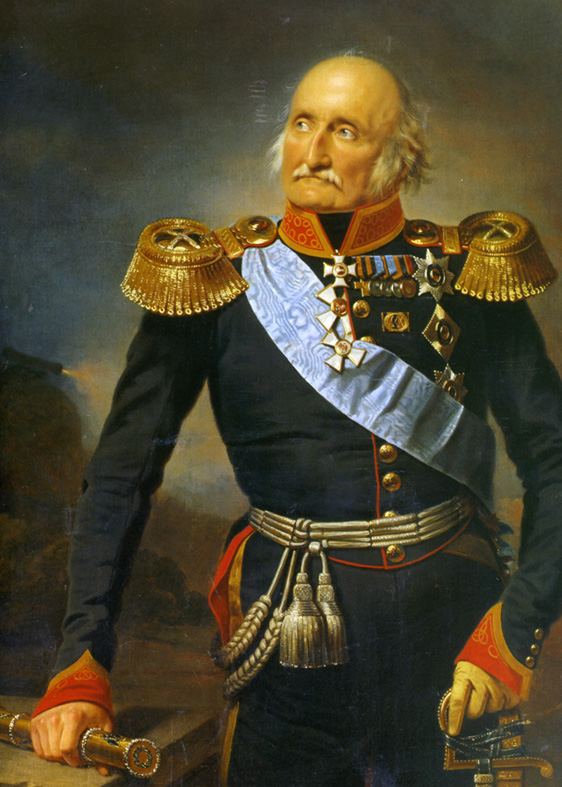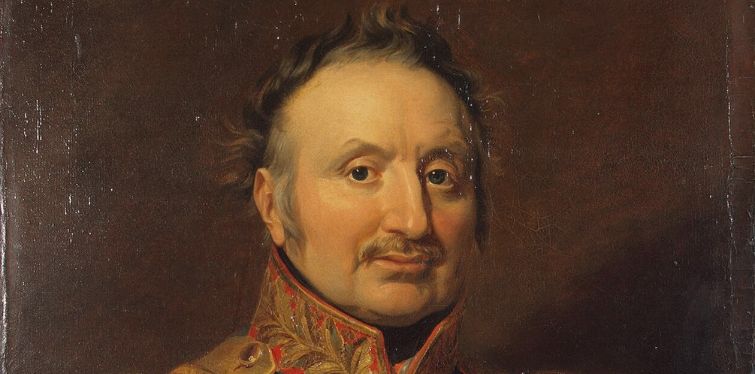The latest installment of our Russian campaign blog series takes a look at the life and military career of Pyotr (Peter) Wittgenstein, one of the most celebrated heroes in the Russian army during the Napoleonic invasion of 1812 but who has been overlooked in many histories of the campaign.
Prince Pyotr Wittgenstein (1769-1843)
A member of the German princely family of Sayn-Wittgenstein, Count (later Prince) Pyotr Wittgenstein was born in 1769 in Pereiaslav, modern-day Ukraine. His father, Count Christian Louis Casimir, had been among the many German soldiers who were brought into Russian service by Tsar Peter III. The young Count Pyotr followed his father’s footsteps into the Russian army and began his career as a light cavalry officer.
After first seeing action in the suppression of the Kosciuszko Uprising in 1794-95, where he demonstrated his courage and horsemanship, Wittgenstein served in Count Valerian Zubov’s Persian expedition of 1796. Following the capture of the fortress of Derbent, one of the few Russian successes in the abortive campaign, Wittgenstein was sent back to deliver news of the victory to St Petersburg.
He enjoyed rapid promotion during the reign of Tsar Paul, becoming Major General in 1798 at the age of 29, but was then dismissed from service by the capricious Paul at the beginning of 1801. Paul’s assassination and the accession of Alexander I saw Wittgenstein return to the army, and he fought with distinction in the 1805 and 1807 campaigns against Napoleon, albeit while continuing to hold minor commands.

Wittgenstein rose to particular prominence during Napoleon’s invasion of 1812. As commander of I Corps in Barclay de Tolly’s First Army, he was detached with his 23,000 men to defend the approaches of St Petersburg against Marshal Oudinot and Marshal Macdonald, while the rest of the First Army fell back to Vitebsk. While Wittgenstein and his men would play no part in the major battles of the campaign – Smolensk, Borodino, and Maloyaroslavets – and is therefore overlooked in many histories, his contribution to Napoleon’s defeat was considerable.
Oudinot’s II Corps was 40,000 strong and in theory was more than a match for Wittgenstein, especially in conjunction with Macdonald’s X Corps, most of which was engaged in the Siege of Riga. However, Oudinot proved incapable of commanding an independent force and failed to effectively coordinate with Macdonald. As a result, over the three day Battle of Klyastitsy between 30 July and 1 August, Wittgenstein routed Oudinot and forced him to fall back on Polotsk and seek reinforcements from Napoleon. While French casualties were far heavier than Russian, Wittgenstein’s vanguard commander Yakov Kulnev had been killed in an ambush during the pursuit. Nevertheless, Wittgenstein’s victory provided a much needed morale boost in St Petersburg, where he was hailed as the ‘saviour of Petersburg.’
After his victory at Klyastitsy, Wittgenstein felt emboldened to attack Oudinot at Polotsk on 17-18 August, while Napoleon’s main army was engaged in the struggle for Smolensk. Wittgenstein captured Polotsk on the first day, during which Oudinot was wounded and succeeded by Laurent Gouvion St-Cyr, whom Napoleon had been sent with his VI (Bavarian) Corps to reinforce Oudinot. St-Cyr proved far superior to his predecessor, and succeeded in forcing Wittgenstein back, winning his Marshal’s baton in the process. While the Russians suffered a tactical defeat, the French did not seek to advance further and Wittgenstein had achieved his strategic objective of preventing the enemy from advancing on St Petersburg. Moreover, his strategic position was improving by the day, not only with plentiful supplies from the Pskov region, but with the approach of 20,000-strong Finnish Corps under General Fabian Steinheil.
The northern flank remained quiet for two months, but by then the strategic situation had changed considerably for the whole campaign. By mid-October, Napoleon was leaving Moscow and turning south hoping to resupply his army, while Kutuzov’s main Russian force was lying in wait at Tarutino. Meanwhile, with Steinheil’s reinforcements, Wittgenstein’s corps was now 50,000 strong. On 18 October the Russian general therefore attacked St-Cyr at Polotsk and took the city in a three day battle, though the French marshal avoided being encircled. In an effort to shore up his northern flank, Napoleon ordered Marshal Victor’s IX Corps, hitherto stationed in reserve in Smolensk, to re-establish the defensive line on the river Dvina. Wittgenstein managed to defeat Victor’s efforts to do so in the battles of Chashniki and Smoliani, retaking Vitebsk in the process and preventing Napoleon’s intentions of setting up winter quarters there.
In late November, Wittgenstein’s force was now part of three Russian armies converging on the River Berezina. Kutuzov’s main army had routed Napoleon at Krasny over four days from 15 to 18 November, while Admiral Pavel Chichagov’s Army of the Danube was approaching from the southwest. Wittgenstein advanced steadily, afraid that Napoleon would join Victor and concentrate their forces against him. During the Battle of Berezina from 26-29 November, Oudinot and Victor rejoined Napoleon’s depleted main force and 30,000 men of the Grande Armée managed to get across the river, leaving a similar number of stragglers behind. While Chichagov has been blamed for the Russian failure to trap Napoleon at the Berezina, both Wittgenstein and Kutuzov advanced rather slowly and failed to engage until a large part of Napoleon’s men had already escaped.

In the early months of 1813, Wittgenstein continued to operate independently and liberated Prussia from French control. By February, Prussia had already joined Russia (and Britain and Sweden) in the Sixth Coalition. When Kutuzov fell ill and died at the end of April, Tsar Alexander appointed Wittgenstein commander-in-chief of the allied army. In many ways he was the obvious candidate, having achieved a string of victories in 1812 and enjoying the goodwill of the Prussians for his earlier campaign. However, Wittgenstein was outranked by Generals Tormasov, Miloradovich, and Barclay de Tolly, who had quietly returned to take over Chichagov’s command. Tormasov chose to leave headquarters and returned to Russia in a fit of anger.
Commanding a much larger force than he had before, Wittgenstein asked Prussian commander-in-chief Blücher to borrow the brilliant Gerhard von Scharnhorst as chief-of-staff. Scharnhorst duly served as Wittgenstein’s chief-of-staff at the Battle of Lützen on 2 May, but received what would eventually become a mortal wound. While Wittgenstein was defeated, the allied army retreated in good order and Napoleon lacked sufficient cavalry to secure a decisive victory. It was a similar story with the Battle of Bautzen on 20-21 May. Nevertheless, the knives were out for Wittgenstein who demonstrated his lack of experience commanding such a large army. A few days after the Battle of Bautzen, he resigned the post and recommended Barclay de Tolly to be appointed in his place.
After Austria’s entry into the Sixth Coalition and the reorganisation of the allied armies, Wittgenstein’s corps was part of Schwarzenberg’s Army of Bohemia and participated in the battles of Dresden and Leipzig, forcing Napoleon to abandon Germany and limit himself to the defence of France. At the Battle of Bar-sur-Aube on 27 February 1814, Wittgenstein led a Russo-Bavarian vanguard to defeat Marshal Macdonald, but was heavily wounded in the process.

After returning to Russia, in 1818 Wittgenstein succeeded General Bennigsen as commander of the Second Army, and was made field marshal in 1826 shortly after Nicholas I’s accession to the throne. In 1828 he was named commander-in-chief of the Russian forces in the war against the Ottomans, but he had to retire due to ill health the following year. He lived out his days as one of the richest men in the Russian Empire, owning over 70,000 serfs. In the mid-1830s he was awarded the title of Serene Prince in both Prussia and Russia. He died in 1843 in Lemberg (Lviv) while on his way to Germany to seek treatment for his ill-health.
While Wittgenstein was one of the most famous men in St Petersburg in 1812 due to his role in protecting the imperial capital from the invader, most histories of the 1812 campaign, especially those from a French perspective, focus on the experience of Napoleon's main army advancing towards and retreating from Moscow. Despite this, Wittgenstein did play a major role in the Russian war effort, keeping four French corps (Oudinot, Macdonald, Saint-Cyr, Victor) at bay over the course of the campaign.
We hope you enjoyed this blog post. To keep up to date with new posts, please sign up to our newsletter and get a free copy of our Battle of Borodino e-book. If you’re interested in buying some products featuring Russian generals of 1812, please check out our Russian collection.



Share and get 15% off!
Simply share this product on one of the following social networks and you will unlock 15% off!